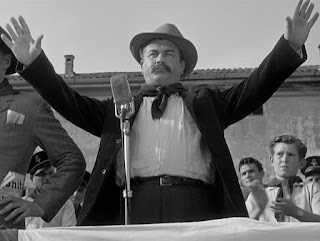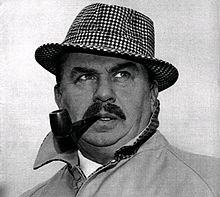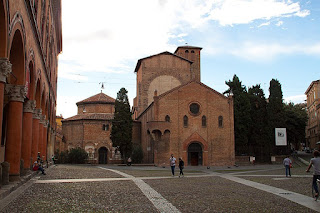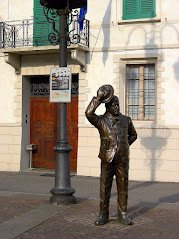Star best known for Don Camillo and Maigret
The actor Gino Cervi, a star of cinema and television screens in Italy for more than four decades as well as an accomplished stage performer, was born on this day in 1901 in Bologna.
Gino Cervi in his role as Peppone, the Communist
mayor, in the first of the Don Camillo film series
Although his movie credits run to more than 120, he is probably best known for his portrayal of the Communist mayor Peppone in the Don Camillo films of the 1950s and ‘60s, and for playing Chief Inspector Maigret in the Italian TV series of the ‘60s and ‘70s based on the crime novels of Georges Simenon.
Cervi was the father of Italian film producer Tonino Cervi and the grandfather of actress Valentina Cervi.
Born Luigi Cervi in the historic Santo Stefano district of Bologna, Gino’s interest in acting had its roots in his journalist father Antonio’s job as theatre critic for Il Resto del Carlino, the city’s daily newspaper.
As a boy, he persuaded his father to take him to the theatre, soon developing an ambition to be a stage actor, which is where his talents first became known.
After his stage debut in 1924 - sadly, too late to be witnessed by his father, who died in 1923 - Cervi was invited the following year to join the company of the Teatro d’Arte di Roma, where the artistic director was the playwright, poet and future Nobel Prize winner Luigi Pirandello, working with actors of the quality of Lamberto Picasso, Ruggero Ruggeri and Marta Abba.
 |
| The writer Luigi Pirandello saw Cervi's acting talent |
By then he had already made his film debut but it was not until he formed a working relationship with Alessandro Blasetti, the director sometimes described as the father of modern Italian cinema, that his screen career really took off.
Blasetti directed him in a series of successful movies including Ettore Fieramosca (1938), Un'avventura di Salvator Rosa (1939) and La corona di ferro (1941), followed by 4 passi fra le nuvole (1942), the film considered to be the precursor of the neorealism movement that dominated Italian cinema for a period in the late 1940s and early ‘50s.
Yet Cervi’s star was to climb still higher in the 1950s, when he was chosen for the role of Peppone, the Communist mayor of a fictional town in northern Italy invented by writer Giovanni Guareschi, who is constantly at odds with the town’s rather hot-headed parish priest, Don Camillo.
The two characters made their screen debut in Le Petit Monde de don Camillo - The Little World of Don Camillo - in 1952, bringing fame both to Cervi and to Fernandel, the French comic actor cast as the priest.
The movie, an Italian-French co-production directed by the French director Julien Duvivier, was the highest-grossing film of all-time in both Italy and France, attracting 13.2 million cinema admissions in Italy and 12.8 million in France.
Cervi and Fernandel became firm friends and their on-screen relationship was central to the success of both the original feature and its four sequels between 1953 and 1965. A fifth was started in 1970 but was left unfinished because Fernandel was in failing health.
 |
| Cervi was oustanding in the role of Commissario Maigret on TV |
Le inchieste del commissario Maigret - The Investigations of Commissioner Maigret - had four series over the course of eight years, comprising a total of 35 episodes. There was also a spin-off movie, Maigret a Pigalle, which was produced by Tonino Cervi.
Again, Cervi’s interpretation of the character garnered considerable critical acclaim, even from Simenon himself.
Cervi was married for much of his adult life to Angela Rosa Gardini - known as Ninì - a young actress he met in 1928 and married soon afterwards. In later life, they divorced and he married Erika Mayer.
Once a committed supporter of the Fascist party, he took part in the March on Rome in 1922, but would later denounce Mussolini’s regime. He switched his allegiance to the Christian Democrats after World War Two and later joined the Italian Liberal Party, for whom he served as a councillor in Lazio.
Although he retained an affection for Casalbuttano ed Uniti, a town near Cremona in Lombardy where his father had a house, Cervi spent his final days on the Tuscan coast at Punta Ala, a tiny coastal village on a headland opposite the island of Elba, where he died in 1974 at the age of 72, not long after he had retired from the stage.
He is buried alongside his first wife and their son, Tonino, who died in 2002, at the Flaminio cemetery in Rome.
Travel tip:
The Piazza Santo Stefano in Bologna, looking
towards the church of the Holy Sepulchre
The centrepiece of the Santo Stefano district of central Bologna, in which Gino Cervi’s family lived, is the Basilica di Santo Stefano, unusual in that it is actually a complex of seven religious buildings from different eras, clustered around Piazza Santo Stefano. It is known locally as the Sette Chiese - the Seven Churches - as a result. The original building, designed to resemble the church of the Holy Sepulchre in Jerusalem, was built according to tradition by Saint Petronius in the fifth century, when he was a bishop of Bologna, over the site of a pagan temple to Isis. The other buildings include the Lombard church of the Crucifix, the church of the Calvario, the church of Saint Vitale and Saint Agricola - the oldest part of the complex, dating back to the fourth century - and the Church of the Trinity, which was restructured between the 12th and 13th centuries.
Travel tip:
The bronze statue of Peppone
in front of Brescello town hall
The town of Brescello on the south shore of the Po river, a little over 20km (12 miles) northeast of Parma in Emilia-Romagna, has become a tourist attraction since being chosen as the location for the Don Camillo films in which Gino Cervi starred. The town, which has its origins in the Roman era, has a museum dedicated to the characters of Don Camillo and Peppone, which can be found in Via Edmondo de Amicis, a few steps from Chiesa di Santa Maria Nascente, the town’s main church, which overlooks Piazza Matteotti, the central square in which there are bronze statues of Don Camillo (in front of the church) and Peppone (by the door of the town hall). The statues were created by Andrea Zangani, a sculptor from the nearby province of Mantova, to mark the 50th anniversary in 2001 of the first Don Camillo film.
Also on this day:
1461: The birth of Renaissance cardinal Raffaele Riario
1469: The birth of writer and diplomat Niccolò Machiavelli
1764: The death of philosopher and art collector Francesco Algarotti